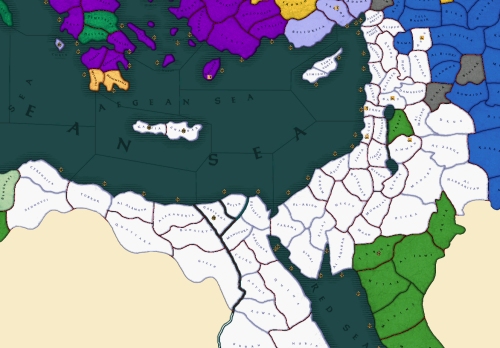Part 7: VII. Archambaut the Bastard and Louis I 1245-1265 A.D.
He had come from behind, and now he was king. Not just a bastard, but the youngest of a pair of bastards, Archambaut had been raised a soldier. It was a big step up, and not everyone was happy with it. Archambaut had a diplomatic skill of 1, and even with a decent Chancellor to help his vassals still didn't like him much. He would have to take things very slowly and very cautiously for a while.
Although his wife had not yet produced and heir, they were both young and had plenty of time. Until that point, however, he had to worry about his cousin Louis, in Egypt, with his horde of boys. Louis who was next in line for the throne.
There was one other small problem. Fifty-six years ago, in 1189, there had been rumors in the court that Baldwin IV had been cuckolded and that Charles was not really his son. Baldwin had dismissed and suppressed those rumors. He had believed himself to be Charles' father. But now those rumors had returned, because if they were true the Archambaut was a double bastard and not even descended from the royal bloodline at all!
Archambaut dealt harshly with those who whispered behind his back. He would prove to the Kingdom that he was fit to be King. He would prove those who lied about his heritage wrong. He swore to himself that he would be the greatest King that Jerusalem had ever seen.
But God had other plans.
In January of 1248, King Archambaut fell ill.
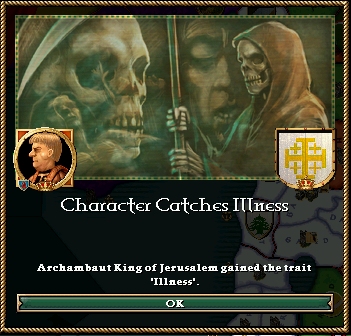
Confined to his bed, he did find comfort in music, and bards and players from around the Kingdom came to serenade him. Although it took away the stress he felt, it did nothing to cure his sickness.

Archambaut lingered in bed. In June his sickness worsened, to pneumonia. Early in July of the year 1248, at the age of 22, he succumbed to it.
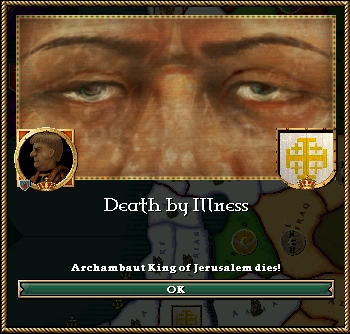
The belief across the Kingdom that he had been cursed by his base origins. The Bishop of Jerusalem loudly and publicly stated that God had removed the Bastard King from the most Holy Throne of the Kingdom of Christ.
Louis and his sons hurried to Jerusalem and there he was crowned. King Louis, at last.
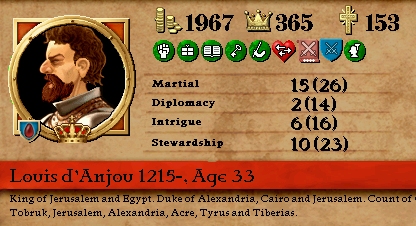
Louis' blood was well known to be pure. Descended from Baldwin through King Charles' younger brother Gauthier, his family had ruled in Egypt for many years. When the bastard Archambaut had, against all odds, convinced his father to legitimize him, denying Louis the throne he had said and done nothing, trusting in God.
Now, God had delivered him the Crown.
Louis' eldest son and heir was Jacque, and the young man was the spitting image of his father.
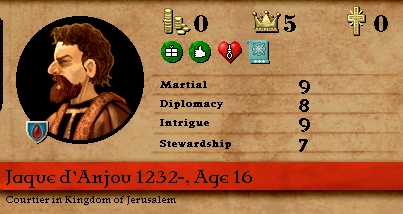
Jacque's did, however, suffer from severe depression.
Louis also had several more sons. Girard: 13 years old, Balian: 11, and a bastard, Baldwin, who was 10.
The nobles of the Kingdom rapidly discovered that Louis was no more a diplomat then Archambaut was, having only 2 points of diplomacy. Although most of his vassals remained loyal, the Duke of Antioch, who had been a close friend of Archambaut attempted to start a revolt against King Louis.

The war ended quickly, and King Louis gave the Duchy to one of his more loyal courtiers. Eastward, news came that the Ayyubid Caliphate (the middle eastern remenants of Saladin's Egypt) had retaken Baghdad from the Mongols.
Around the time Archambaut had taken the throne a large chunk of the Ayyubid Caliphate had risen in rebellion. Early in 1249, Louis decided to invade the rebelling territories to secure land for his eldest son, Jacque.
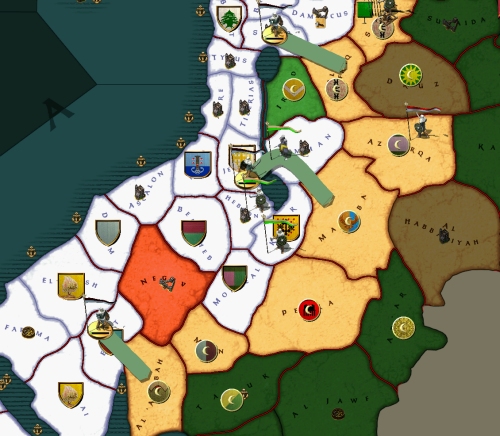
By the end of the year all the target territories are absorbed, reorganized into a Duchy of Damascus, and handed off to Jacque.
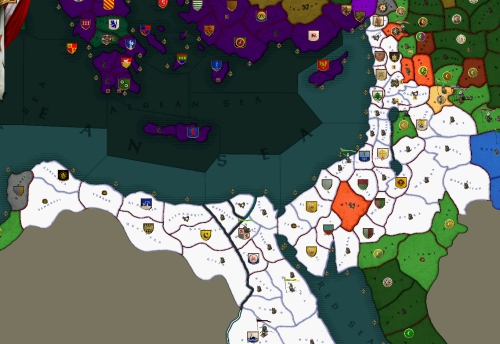
But peace has scarcely lasted two months before Guy, Duke of Cairo, bastard born son of King Charles and brother to dead King Archambaut raises the banner of revolt and civil war.
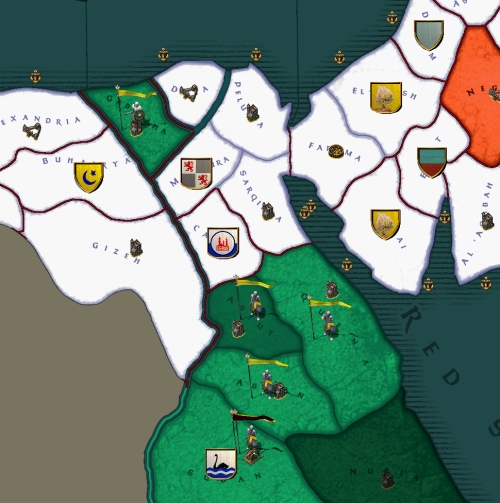
During the war, which lasts for nearly a year, news comes that a new wave of Mongolian invaders has entered Russia: The Golden Horde.
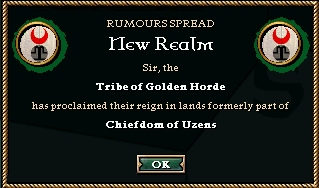
By Christmas of 1250, Guy's revolt has been crushed and King Louis hands the Dukedom and rebellious territories over to his younger brother, Henry. Taking so much land in so short a time has done a number on Louis' reputation so he lays low for a while and reorganizes some of his demesne as Bishoprics to boost his piety and reputation recovery rate.
In 1251, Louis sacks his court Steward. Twice in recent years, once just before the war and once during it, huge sums of money went missing from the royal treasury, putting the Kingdom back in debt. Once the Steward is fired the problem disappears.
1252 is a year of temptation for King Louis. In January he barely resists the temptations of a pretty serving maid in his employ. He already feels bad enough about the one bastard he already sired and the feels the Kingdom scarcely needs another! But in September he's badly tempted again.

His choices are basically to either have a bastard or become chaste. Already having a bunch of sons he pushes the lady away, insisting that adultery is a terrible sin. As a result, King Louis becomes chaste, although this does not seem to stop him having a couple more daughters on his wife over the next few years.
In 1253 the Crusade for Cordoba fails, amazingly enough. Although the city was captured by Christians the Islamic presence in southern Iberia has actually increased and Cordoba itself recoccupied. It is a great shame for the Christian faith.
Later that year, Louis' third son, Balian, reaches adulthood.
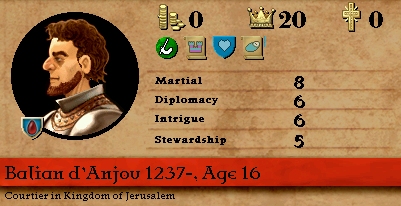
Although he seems normal enough, behind the neckbeard, Balian is a bit…. Odd. He is his own rival. Twice.

In the spring of 1254, King Louis decides the time has come, at last, to reclaim the province of Negev. No longer owned by France, it is now a part of the English Duchy of Oxford. By July of 1254 the province has been conquered, but the war drags on and on.
England and their ally, the Duchy of Lorraine both land troops in the Sini and march to the relief of Negev. The Kingdom beats them back and Lorraine at least begs for peace, paying over 2000 gold in indemnities. England however is not so easy and refuses to make any sort of peace with the Kingdom.
Still, the English armies only come on occasion and while the armies are in the field, King Louis figures he might as well get some use from them. In the fall of 1256 he attacks the Emirate of Allepo on the northeast boundries of the Kingdom.
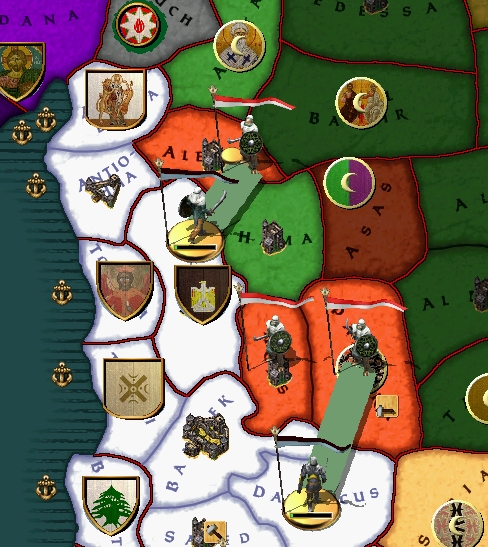
By the summer of 1257 peace has been signed with Egypt and Allepo has been annexed. All is well again in the Kingdom of Jerusalem.
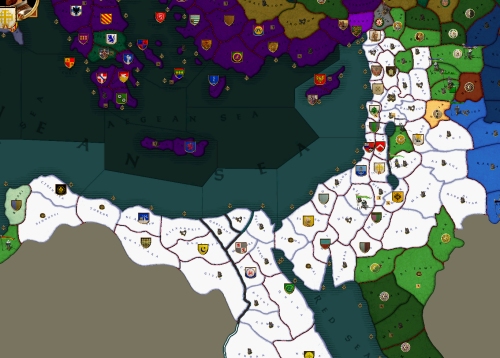
After the war is over, King Louis' bastard son Baldwin approaches him.
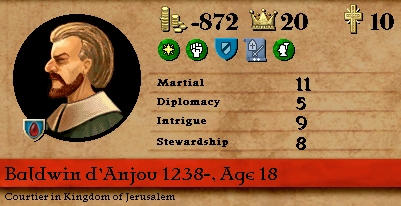
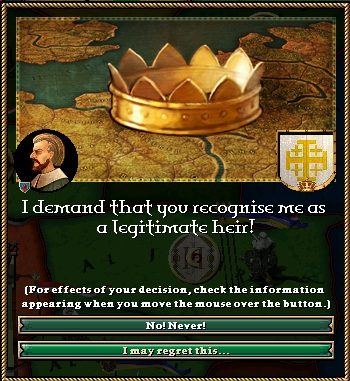
Archambaut has been cold in the grave for nearly ten years, and King Louis loves and believes in his son. After long and careful consideration he legitimizes him. The boy is still fourth in line of his sons, after all, is not likely to become King.
But again, shortly after the war has ended, Egypt rises in rebellion. This time is King Louis' own brother Henry who revolts, undoubtably over the matter of Baldwin being legitimized.
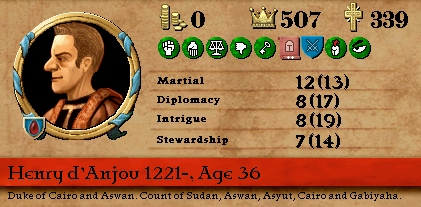
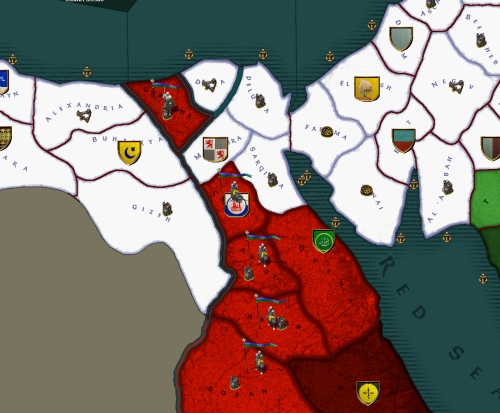
During the war news comes to King Louis that his son, Balian is requesting permission to fight a duel with his archrival. A duel is an honorable thing and without giving it enough though, Louis agrees. But both of Balian's rivals are… himself, and no matter who wins, Balian dies. The poor, confused boy is quietly given a Christian burial despite rumors of suicide. After all, King Louis is already upset enough about having to war against his own brother.
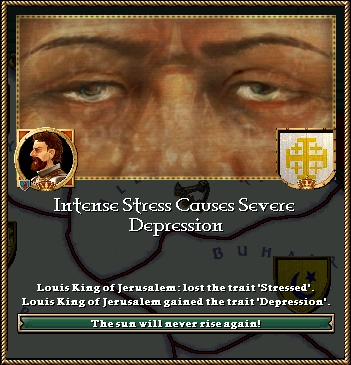
When the war ends in 1258, Henry's territories are no confiscated. Instead he is forced to re-swear alligance to King Louis and the Duchy becomes part of the Kingdom again. Louis doesn't need any more bad reputation and Henry's average loyalty gain is actually positive. It must have been some event that broke him free.
The next few years pass peacefully, but in January 1263, King Louis' wife, Anne, dies a natural death. In October, Louis decides to remarry. He is 47, to be sure, be he could still sire a few more sons. He chooses and is completely smitten with a young lady named Alais.
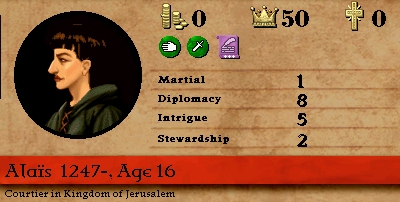
Many nearby rulers come to celebrate the lavish wedding and King Louis happily takes his bride in early December. But Alais is not the fine young woman that she appears. Scarcely a few weeks after the wedding, while many guests are still in Jerusalem, King Louis walks in on his wife naked and straddling the Prince of Cyprus.
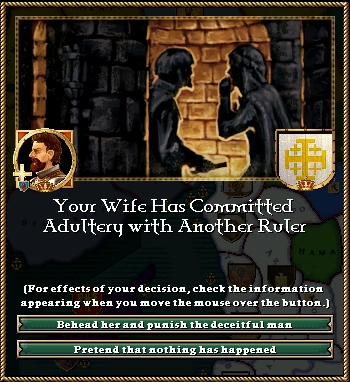
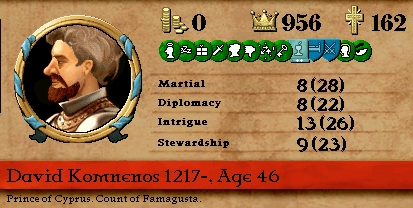
Prince David escapes out the window, but not before he is stabbed and badly wounded by King Louis. Queen Alais is dragged out to the public square and beheaded. King Louis swears he will never remarry.
Moreover, he must have vengeance. Now is the time to fulfill his grandfather's claims on the island of Cyprus. He declares war on the dastardly David Komnenos. It goes without saying the Byzantine Empire comes to the support of their vassal.
Fortunately for the Kingdom, the Byzantines are quite involved in war with the Golden Horde who have neatly bisected their Russian territories.

In May of 1264, fourteen thousand Kingdom troops land on the shores of Cyprus and another six thousand land on Crete. The destruction of David Komnenos' lands is profoundly satisfying to King Louis. By October both islands are conqured and soldiers of the Kingdom have landed on the Byzantine mainland and are burning Nicea.
Early in January of 1265, ten thousand battle worn troops arrive outside the gate of Constantinople. It is unlikely in the extreme that they can breach the walls, but they don't have to. The Byzantine Emperor offers a white peace and formally apologizes for the behavior of his vassal.
King Louis reorganizes Crete into a pair of Catholic Bishoprics, but Cyprus? Cyprus he keeps for himself.
